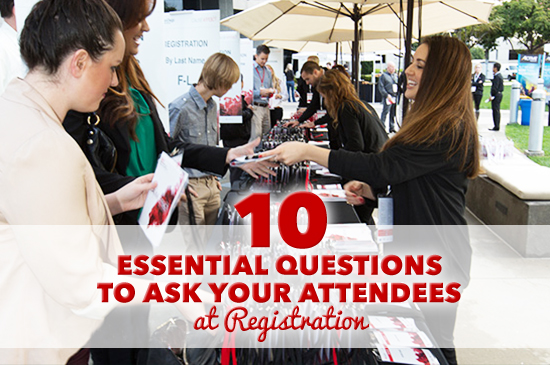This is a sponsored post written by Kevin Iwamoto, Vice President of Industry Strategy, Lanyon. More information about Event Manager Blog’s sponsored posts.

Information is powerful. What you know about your attendees’ needs and requirements empowers you to create an all-round successful event. That’s why it’s super-important to — at the point of registration — to ask attendees all the right questions.
Get the Basics … Plus
Of course, you want to ask basic information in order to properly register attendees — including attendee profile data, contact information, and hotel accommodation requirements. But if you want to surpass the expectations of attendees, exhibitors, sponsors, and presenters, you need to know even more.
According to Anna Dalglish, Director of Product Management for RegOnline® by Lanyon, event planners need a deeper understanding of their attendees. With in-depth knowledge captured during registration (as well as leading up to, during, and after the event), planners can optimize each of their events to their audience’s specific needs and create meaningful connections — both among attendees and between attendees and the speakers and exhibitors.
She added that, to run a successful, memorable event, you need flexible event planning software that enables you to ask the right questions.
Smart Questions Make for Smarter Events
We’ve identified 10 data points to collect from your event attendees during registration. This information will help you fully understand attendees’ expectations — so you can plan to meet those needs, help your exhibitors and presenters deliver on attendees’ expectations, and promote your event.
Ask your attendees about what “takeaways” they expect from your event. Some may be coming to increase their knowledge, while others may be seeking to expand their professional network. And if you’re putting on a trade show — many may be coming to meet new suppliers. Whatever their reason(s), this information will help you channel your efforts and resources to ensure all attendees benefit from attending your event.
2. Arrival times.
Knowing when your attendees arrive at your hotel or event venue will help you plan for the right level of check-in staffing to handle peak crowds. Using this information, you can also arrange for buses to pick up crowds of attendees at the airport or to shuttle them from the hotel to the conference venue.
3. Emergency contact information.
Hopefully, you never have to use this information — but knowing whom to contact if an attendee needs help is invaluable.
4. Disabilities.
The Americans with Disabilities Act requires companies or organizations that lease space in public facilities for events, conferences, seminars or meetings to ensure those activities are accessible to people with disabilities. Knowing ADA requirements (and similar legislation in other areas of the world, like Britain’s Disability Discrimination Act, 1995) in advance will help you plan to accommodate their needs.
5. Food allergies.
The health and safety of your attendees come first! With this information, you can make sure that your hotel and venue take the right precautions when preparing food for attendees with allergies or other eating concerns.
6. Social media “handles.”
Get this data so you can research what’s being talked about on Facebook, Twitter and LinkedIn — and refine your social media strategy, push conference information to the right audience, and build excitement before the event (e.g. posting teaser videos from presenters or exhibitors).
7. Session and event preferences.
Get a clear picture of which receptions your attendees will likely go to — so you can more accurately determine the necessary food and service levels. Ask, too, which scheduled educational sessions they’ll attend and which exhibitors interest them. Then, give your presenters and exhibitors that information — so they can prepare and customize their content/offerings.
8. Payment information.
Don’t forget to ask about credit card or purchase order information. That way, you’ll be able to collect conference and event fees in a timely, efficient manner. With an automated event platform, like RegOnline® by Lanyon, you can collect payment information securely at the time of reservation — saving you time and reducing errors.
9. Roommate information.
These days, many organizations are trying to make the most of their meetings travel budgets — including doubling up employees in hotel rooms. You’ll need this information to provide accurate room list information to your event’s hotels.
10. Clothing size.
Giving away free t-shirts, hoodies, jackets, etc.? You’ll need to know the correct sizes when ordering.
In Conclusion
As an event planner, you want to turn “registrants” into “satisfied attendees” — and hopefully, “returning attendees.” One of the ways you can do that is by getting good information from them — in advance of their arrival at your event. When you’re fully prepared, you’re best equipped to give attendees the excellent event experience they want.





